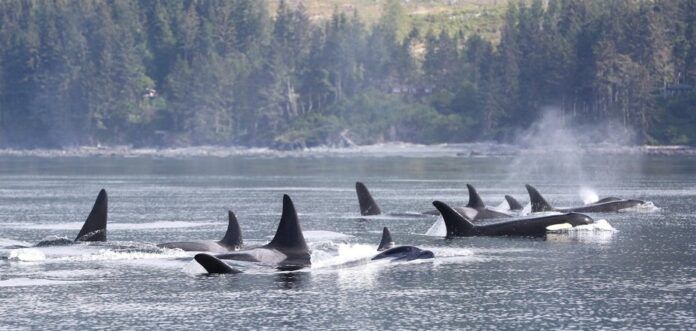Population decline of southern resident killer whales appears to be getting worse because of inbreeding.
The finding is from researchers at the National Oceanic and Atmospheric Administration, who say it has revealed why the whale population is not thriving.
They say newly sequenced genomes from the 73-whale population show inbreeding is a problem, in addition to human impacts and disturbance, contaminants and potential prey limitations.
Inbreeding can cut the lifespan of whales almost in half, according to the administration and without more population mixing it is likely to continue the decline.
They say killer whales start reproducing at around 10 years old and reach their prime at around 20. However, highly inbred whales had less than half the chance of surviving through those prime years to reach 40 compared to the least inbred whales, according to the study.
They add females with low inbreeding produce an average of 2.6 offspring during their lifetimes compare to 1.6 for whales with high levels of inbreeding. There needs to be at least two surviving offspring per female to maintain stable or increasing numbers, according to the administration.
“This is hard news for everyone who cares about this unique population of killer whales so closely tied to the northwest,” said Marty Kardos, a research geneticist at NOAA Fisheries’ Northwest Fisheries Science Center and a lead author of the new research.
“At the same time, this begins to answer long-standing questions about why substantial recovery efforts have not produced the results we hoped for, and what the future options might be.”
In the past, researchers would focus on three main threats that affect the whales including fluctuations in salmon prey, toxic pollutants and disturbance and noise from ships and other vessels.
However, inbreeding is making the population more sensitive to these threats and scientists say the threats need to be a bigger priority.
“The whales are not necessarily dying of inbreeding itself, they are dying prematurely because inbreeding has set them up to be more vulnerable to diseases or other problems,” said Northwest Fisheries Science Center researcher Brand Hanson.
“We need to minimize the potential for those factors to have an impact.”
Science center statistician Eric Ward adds it would “be a mistake to see this as inbreeding alone causing the decline.”
“Over the last 50 years, this population has been impacted by multiple stressors, and the relative impact of various threats on the Southern Resident population has fluctuated through time,” said Ward.
“These combined impacts, coupled with the mating system of killer whales—where only a few males are contributing to the gene pool—may have made inbreeding a more significant threat in recent years.”






